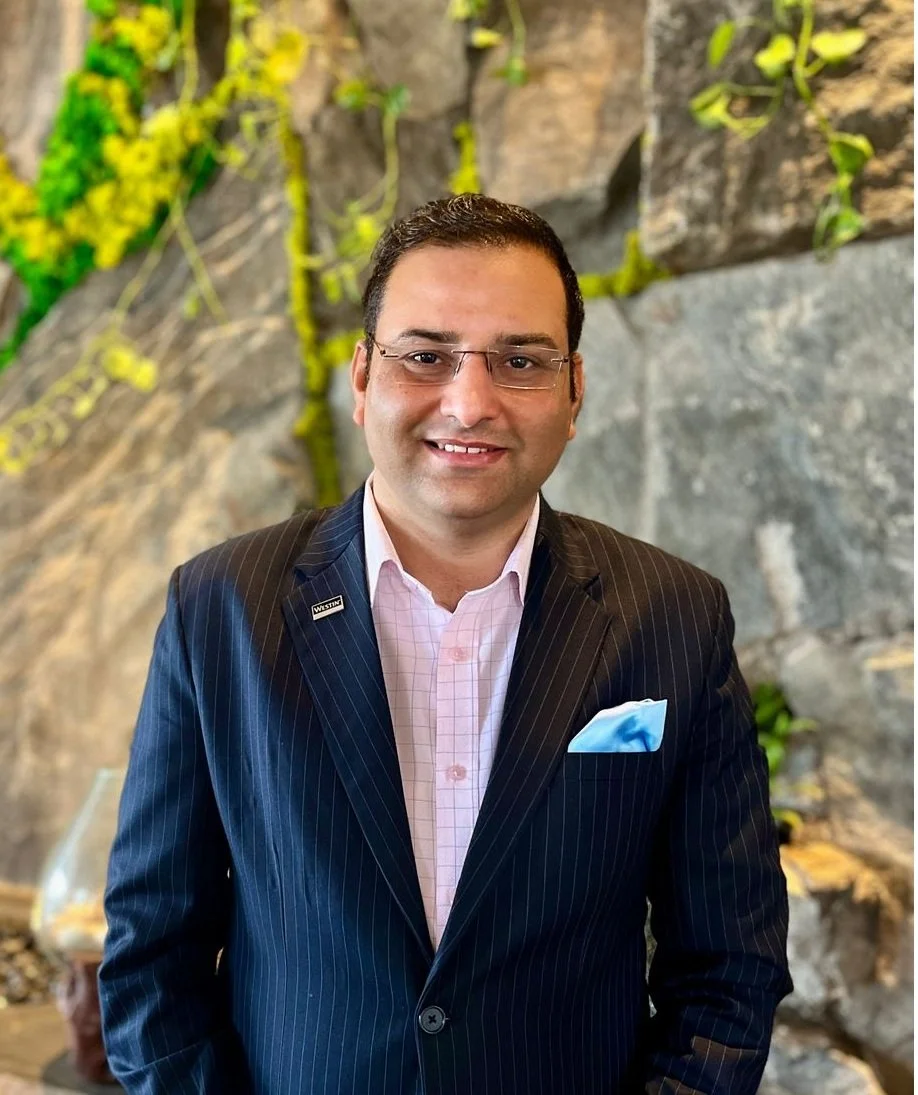Exclusive Interview | Saurabh Mangal, Hospitality Trainer
/“Resilience is key—weathering challenges while upholding service standards. Above all, it’s a passion for growth that keeps the industry moving forward, embracing innovation and striving for constant improvement.”
Tell us about your journey. How did it all start?
My journey in the vibrant world of hospitality began over a decade ago, freshly armed with a Bachelor's degree in Hotel Management from IHM Lucknow in 2006. Starting as a Front Office Assistant at The Landmark Hotel, I embarked on a diverse and enriching expedition through the industry's various facets.
My path led me through pivotal roles, from managing operations at renowned establishments like Hotel Royal Cliff and contributing as an Operations Manager at Clarks Inn. Each step was a canvas for learning, honing my expertise across room divisions, revenue management, and overall operational efficiency.
Fueling my passion for both hospitality and education, I ventured into academia. My roles as an Associate Lecturer at IHM Bhatinda, a Centre Head at Kanpur Institute of Hotel Management, and various visiting faculty positions endowed me with a deep understanding of teaching and management within the realm of hospitality education.
My journey extended beyond the classroom. Engagements as a guest speaker, conducting skill development programs under the Ministry of Tourism, and diverse visiting faculty roles further shaped my commitment to sharing knowledge and nurturing industry talent.
This extensive journey of varied roles and engagements eventually crystallised into my current role as a Hospitality Trainer. It's here that I've found my true calling—leveraging my rich industry experience to nurture the next generation of hospitality professionals.
What do you think it takes to succeed in this industry?
Success in the hospitality industry thrives on a unique blend of skills and qualities. It's not just about delivering service; it's about passion, adaptability, and a keen eye for detail. Effective communication and an empathetic touch are crucial, creating memorable experiences for guests and fostering a positive team environment.
This dynamic field demands continuous learning, staying ahead of trends, and a knack for problem-solving. Leadership and teamwork play pivotal roles, ensuring seamless operations and a cohesive unit working towards a common goal.
Resilience is key—weathering challenges while upholding service standards. Above all, it's a passion for growth that keeps the industry moving forward, embracing innovation and striving for constant improvement.
What according to you can trainees do while they are training at hotels to make it a win-win for them & the hotel/unit?
Trainees hold the key to a mutually beneficial training experience within hotels. Actively engaging in every aspect of their training lays the foundation for a win-win scenario for both the trainee and the hotel/unit.
Observation is crucial; paying close attention to operations, processes, and guest interactions provides invaluable learning opportunities. Seeking and implementing feedback is pivotal, ensuring continuous improvement and skill enhancement.
Taking initiative by volunteering for tasks and projects showcases enthusiasm and a readiness to contribute. Building professional relationships, embracing challenges, and applying learned knowledge in real-time situations further enriches the training experience.
Adaptability and professionalism in behavior and attitude demonstrate versatility and mirror the hotel's standards. Lastly, expressing gratitude towards mentors and staff fosters a positive work environment and strengthens the training journey.
Encouraging trainees to actively participate and contribute not only elevates their individual growth but also adds value to the hotel by nurturing a culture of continuous learning and enthusiastic participation
What are some of the trends you see impacting the hospitality industry?
In today's dynamic hospitality landscape, several trends are reshaping the industry. Personalization is key; guests expect tailored experiences catering to their preferences, from customized amenities to individualized services.
Technology integration is becoming ubiquitous, enhancing guest interactions through mobile check-ins, AI-driven chatbots for guest queries, and data analytics to anticipate guest needs.
Sustainability practices are gaining momentum, with eco-friendly initiatives, sustainable sourcing, and responsible waste management becoming integral to operations, meeting the increasing demand for environmentally conscious hospitality services.
The rise of experiential travel has shifted focus from mere accommodation to providing unique, immersive experiences, be it culinary adventures, wellness offerings, or local cultural immersions.
Furthermore, the evolving landscape of remote work has fueled the 'workcation' trend, prompting hotels to create spaces conducive to both work and leisure, catering to guests looking for a blend of business and relaxation.
Lastly, health and safety measures have taken precedence, with heightened hygiene protocols, contactless services, and stringent cleanliness standards, reflecting the industry's commitment to guest well-being in the post-pandemic era.
Keeping abreast of these trends and integrating them into operations is vital for hospitality establishments to stay competitive and meet the evolving demands of today's discerning guests.
Two things you would like to change in the industry.
If I were to pinpoint two areas for change in the industry, they would be:
Diversity and Inclusion: Enhancing diversity and fostering inclusive practices within the industry is essential. Promoting diverse hiring practices, providing equal opportunities for advancement, and creating inclusive work cultures not only benefit employees but also enrich guest experiences by reflecting a broader range of perspectives and cultural nuances.
Sustainability Commitment: While strides have been made, a more comprehensive commitment to sustainability is crucial. Implementing eco-friendly practices, reducing waste, and promoting sustainable sourcing can significantly minimize the industry's environmental footprint. Embracing renewable energy, reducing single-use plastics, and actively engaging in conservation efforts are pivotal steps toward a more sustainable future for hospitality.
What do you expect the industry to do to support academics?
To support academics, the industry can engage in several initiatives:
Partnerships and Collaborations: Establishing partnerships between industry players and academic institutions can bridge the gap between theory and practice. This collaboration can involve guest lectures, internships, joint research projects, or mentorship programs, providing students with practical exposure and industry insights.
Skill Enhancement Programs: Offering specialized training programs or workshops conducted by industry experts can supplement academic curriculums. These programs can focus on emerging trends, technological advancements, and practical skills required in the field, ensuring students are job-ready upon graduation.
Scholarships and Financial Support: Providing scholarships, grants, or financial aid to deserving students pursuing hospitality-related studies can ease their financial burdens and encourage more individuals to pursue careers in the industry.
Internship and Placement Opportunities: Offering robust internship programs and facilitating placement opportunities for students allows them to gain hands-on experience, applying their academic knowledge in real-world settings.
Continuous Engagement: Regular engagement through industry forums, career fairs, or networking events enables academic institutions to stay updated with industry trends, fostering a curriculum that aligns with the evolving needs of the hospitality sector.
By actively supporting academics through these initiatives, the industry not only nurtures future talent but also ensures a symbiotic relationship between academia and the real-world demands of the hospitality sector.
There is a trend of HM students going abroad for Internships and Jobs. Have you seen this too? Why do you think this is? How can colleges safeguard the students' interests?
Yes, there's definitely a growing trend among Hospitality Management / Hotel Management students opting for internships and jobs abroad. This trend primarily stems from a desire for diverse experiences, exposure to global hospitality practices, and the potential for career advancement.
Colleges can safeguard students' interests in several ways:
Establish Partnerships: Partnering with reputable international hospitality brands or institutions ensures students have access to credible opportunities abroad.
Preparation and Guidance: Offering guidance on visa requirements, cultural adaptation, and workplace norms in foreign countries prepares students for their international experiences.
Quality Assurance: Ensuring internships or job placements meet specific standards, such as fair treatment, appropriate working conditions, and learning objectives, safeguards students' well-being and educational goals.
Support Network: Creating a support network, including alumni or mentors who have experienced international placements, can offer guidance and assistance to students during their time abroad.
Regular Check-ins: Regular communication and check-ins with students during their international experiences help colleges address any concerns or issues that may arise.
By proactively addressing these aspects, colleges can enable students to make informed decisions, ensuring their international experiences are enriching, safe, and aligned with their academic and career aspirations.
The Indian hospitality industry salaries are not considered lucrative by today's graduates. What is your opinion on this? What should the minimum salary for an HM graduate be?
The perception of salaries in the Indian hospitality industry among today's graduates is indeed a concern. While the industry offers fulfilling experiences, the salary aspect often falls short of expectations compared to other sectors.
Determining a minimum salary for hospitality management (HM) graduates can be challenging due to various factors like location, role, and experience. However, aiming for a competitive starting salary that reflects the graduate's education, skills, and the industry's demands is crucial.
Considering the level of dedication, skillset, and specialized knowledge HM graduates bring to the table, a minimum starting salary should be commensurate with the industry standards and the cost of living. It should allow graduates to sustain a reasonable lifestyle while acknowledging their contributions to the sector.
Additionally, to attract and retain top talent, the industry might consider reevaluating salary structures, offering attractive perks, opportunities for growth, and a clear career progression path. Ensuring that the compensation aligns with the demands and responsibilities of the job will not only attract but also retain skilled graduates within the hospitality sector.






